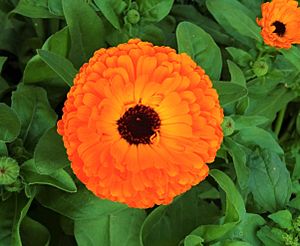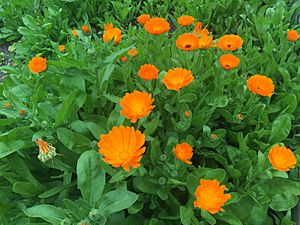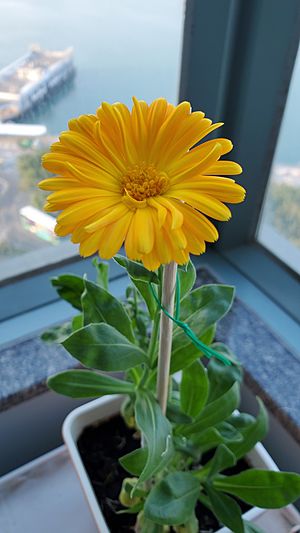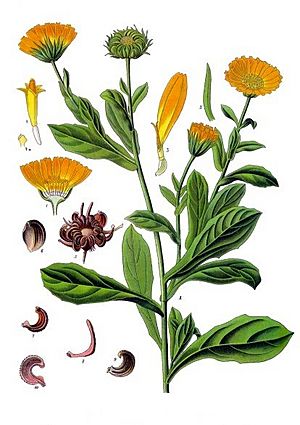Pot marigold facts for kids
Quick facts for kids Pot marigold |
|
|---|---|
 |
|
 |
|
| UBC Botanical Garden | |
| Scientific classification | |
| Genus: |
Calendula
|
| Species: |
officinalis
|
| Synonyms | |
|
|
Calendula officinalis, often called the pot marigold, is a bright and cheerful flowering plant. It is part of the Calendula group, which belongs to the Asteraceae family. This family also includes many other well-known flowers like daisies and sunflowers. Pot marigolds probably first grew in India. In the past, it was even the state flower for some regions in India, such as Junagadh.
Contents
Growing Pot Marigolds
Pot marigolds are quite easy to grow, making them a great choice for young gardeners. They love sunny spots and can grow in most types of soil.
Planting and Care Tips
Even though they can live for more than one year (perennial), people often grow them as annuals. This means they plant new ones each year. This is especially true in places with cold winters or very hot summers. In these climates, the plants might not survive the extreme weather.
Many gardening experts say calendulas are some of the easiest flowers to grow. If you live in a place with mild weather, you can plant their seeds in spring. They will then bloom all summer and into the fall. If your winters are not too cold, you can plant seeds in autumn for flowers during the winter.
The plants grow best in sunny places with rich, well-drained soil. Pot marigolds grow quickly from seeds, often blooming in less than two months. Their flowers come in bright shades of yellow, gold, and orange.
What Do They Look Like?
The leaves of the pot marigold grow in a spiral pattern. They are about 5 to 18 centimeters (2 to 7 inches) long and are slightly hairy. The flowers are usually 3 to 7 centimeters (1 to 3 inches) wide. They have both ray florets (the petal-like parts) and disc florets (the small flowers in the center). Most types of calendula have a slightly spicy smell.
To keep your plants blooming, it's a good idea to "deadhead" them regularly. This means gently removing the flowers that have started to die. This helps the plant make more new blossoms.
Uses of Calendula
Pot marigold flowers are not just pretty; they are also useful!
Edible Flowers and Leaves
The bright petals of the pot marigold are edible. People often use them to add a splash of colour to salads. They can also be used as a garnish on dishes, sometimes even instead of expensive saffron.
The leaves of the plant can also be eaten, but they don't always taste very good. They have been used as a herb and in salads in the past.
Historical and Modern Uses
Long ago, in Ancient Greek, Roman, Middle Eastern, and Indian cultures, calendula flowers were very important. They were used as a medicinal herb to help with various ailments. People also used them as a dye to color fabrics, foods, and even cosmetics. Today, calendula is still used to make oils that can help protect and soothe the skin.
Images for kids
See also
 In Spanish: Caléndula para niños
In Spanish: Caléndula para niños





